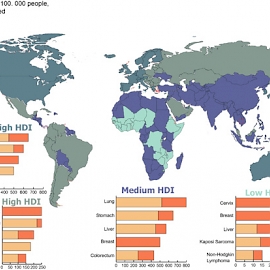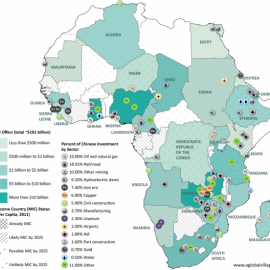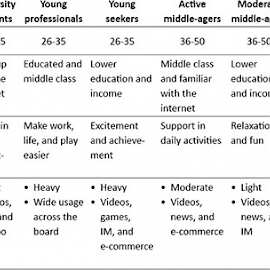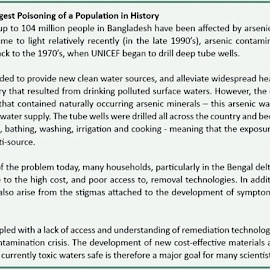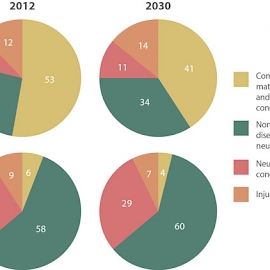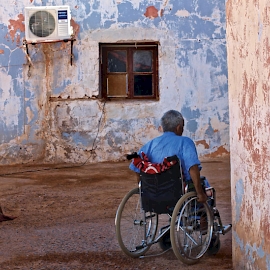Cancer: A Global Issue
While remains a widespread view that cancer only affects those in wealthier regions of the world and the elderly, at least half of cancers are diagnosed today in developing countries and these carry the greatest burden of premature mortality from cancer.
1 May 2013
The Ageing Heart
Research based at Imperial College in the area of Popeye domain containing aims to provide a novel insight into the ageing process and potentially provide new therapeutic opportunities to help the ageing heart.
1 May 2013
Ageing Societies
Better co-ordinating care, improving the flow of patient information and ensuring that adequate funding mechanisms are in place are crucial if societies are to deal with the challenges posed by ageing societies.
1 May 2013
Sexual Harassment in the Workplace
The past half century has seen leaps in women’s working rights, yet statistics show that sexual harassment is still a pervasive threat in the workplace.
1 May 2013
What Do Menstruating Girls Need in Schools?
Imagine trying to attend classes in these schools while you have your menstrual period. Imagine your menstrual period is extremely painful. Imagine your reuse-able pad is soaked through but there is no running water to clean it, or that there is no trash bin to get rid of it. And don’t forget this happens every month.
1 January 2013
Geo-Science Versus the Nuclear Industry
The Japanese government and their domestic nuclear industry are facing a serious dilemma. While geologists caution about the risk of active seismic faults the electric power industry is pressing the need to restart nuclear power plants.
1 January 2013
Investing in Africa
According to the International Monetary Fund, seven of the ten fastest growing economies over the next five years will be in Africa, a figure which is starting to capture the attention of both private and institutional investors.
1 January 2013
The BRICS
Since their emergence as a group, many commentators have championed the BRICS as good news for global health. However, this article seeks to explore whether it is right to assume that their economic accolades readily extend to the sphere of Global Health.
1 January 2013
Learning From Nature
It is possible to conceive of a complete bio-inspired security system concept which is likely to be radically different from more conventional approaches.
1 January 2013
Can We Make Our Demand for Food Sustainable and Secure?
Addressing over-consumption and waste are routes to reducing demand, but these probably won’t balance the need to produce more food. To what extent can we increase food production in a way that is both sustainable and secure?
1 January 2013
China’s Pro-Renewable Energy Approach
This article identifies the broad spectrum of challenges facing China’s energy sector and looks at the impact of this policy intervention on its development.
1 January 2013
How to Plan a Successful Biopharma Product Rollout
Effectively launching a new biopharma product, however, has never been more challenging. In addition to a litany of regulatory issues, companies face high stakeholder expectations, numerous market-access hurdles, and stiff competition, all of which are made more formidable by the business realities of the industry.
1 October 2012
Nanotechnology for Sustainable Development
The science of the very small, nanotechnology could play a key role in tackling many sustainable development issues ranging from fresh water supply and food decontamination to green technology.
1 October 2012
Spending the Money Wisely
All the heroic ambitions for improving global health must confront the prosaic reality of finding the necessary financial resources.
1 October 2012
Multi Drug-Resistant Tuberculosis
This article examines why drug resistant TB has come into existence, how it can be categorized, what treatment options are available and how the global health community plans to combat this growing threat.
1 October 2012
The Age of Minor Metals
Recent friction in the field of rare earths and platinum group metals demonstrate that it will be essential to find a mutually beneficial outcome for the mineral wealthy and the technology rich.
1 October 2012
On the Benefits of Competition in Healthcare
Governments faced with rising costs and growing demand are constantly searching for methods of delivering better healthcare. Reforms which promote competition are currently very much in vogue, yet while the political appeal is simple critics argue that the features of healthcare make the use of competition inappropriate.
1 October 2012
Mental Health and the Military
Never far from the media spotlight has been the mental health of those presently serving in the armed forces, those who have served (veterans), as well as the wider military community.
1 October 2012
Sunny Side Up: Photovoltaics of the Future
Until now only a fraction of 1% of energy has been provided by direct conversion of solar energy, but that is set to change: International Energy Agency projections anticipate that some 11% of electric power will be provided by solar technologies by 2050.
1 October 2012
Burying Our Nuclear Legacy
Geological disposal appears to be the best available approach to long-term nuclear waste management in the UK.
1 October 2012
Re-Thinking Rural Architecture in Syria
This article outlines a model for developing rural housing in Syria by means of relying on local resources including labour, materials and techniques.
1 October 2012
Preventing State Conflict in Cyberspace
Can a normative solution to state-sponsored cyber attacks bring peace to cyberspace?
1 October 2012
Antibiotics in Decline
The majority of antibiotic use is in the community, however the impact of antibiotic resistance is felt most acutely when treating patients in healthcare settings.
1 October 2012
Why Our Nuclear Waste Isn't Going Anywhere
The answer to nuclear waste disposal may lie in deep underground geological storage, yet this strategy faces strong ‘Not In My Back Yard’ opposition.
1 May 2012
China’s Digital Generations
While China is a huge online market, it is not an easy one. Although consumers are rapidly gaining sophistication, they have their own patterns of online consumption and behaviour that are different from those of consumers in the West.
1 May 2012
Lighting up Lives with Energy Efficient Lighting
New Light Emitting Diode (LED) technology could potentially achieve a reduction of 15% in total electricity consumption in developed countries
1 May 2012
Arsenic: Mass Poisoning in the 21st Century
Access to clean water is a fundamental human need. We must find low-cost ways of analysing toxic contaminants in the field, and develop cheap and effective remediation methods.
1 May 2012
Global Mental Health
For global health to truly deliver the overarching aim of health equality for all, it must overcome the artificial dualism separating mental from physical illness
1 May 2012
Healthcare in the Sahrawi Refugee Camps
In 1976 the Sahrawi people, fleeing Moroccan occupation of their neighbouring home nation of Western Sahara, were forced to settle in refugee camps in Tindouf, Algeria. Now, more than 35 years since the first settlements were formed, these temporary camps have evolved into a functioning society. However, the harsh desert environment has forced the camps to rely almost exclusively on international humanitarian assistance for their survival.
The Sahrawi people have had to build a health care system for themselves out of the bare, dry, desert. How did they do it? And what are the major challenges they continue to face?
1 May 2012
Mathematics and Statistics in Finance
Mathematical models for finance evolved radically from about 1900, when Bachelier applied Brownian motion as an underlying process to derive option prices.
1 May 2012
The Politics of Expanding Control of NTDs
Identified as a high impact, cost-effective and deliverable intervention, tackling NTDs through mass drug distribution has recently soared on the aid and development agenda
1 May 2012
Accra Invaded
High rates of urbanisation and population growth has led to housing and infrastructural incapacity in Ghana, threatening the country's economic success story.
1 January 2012
